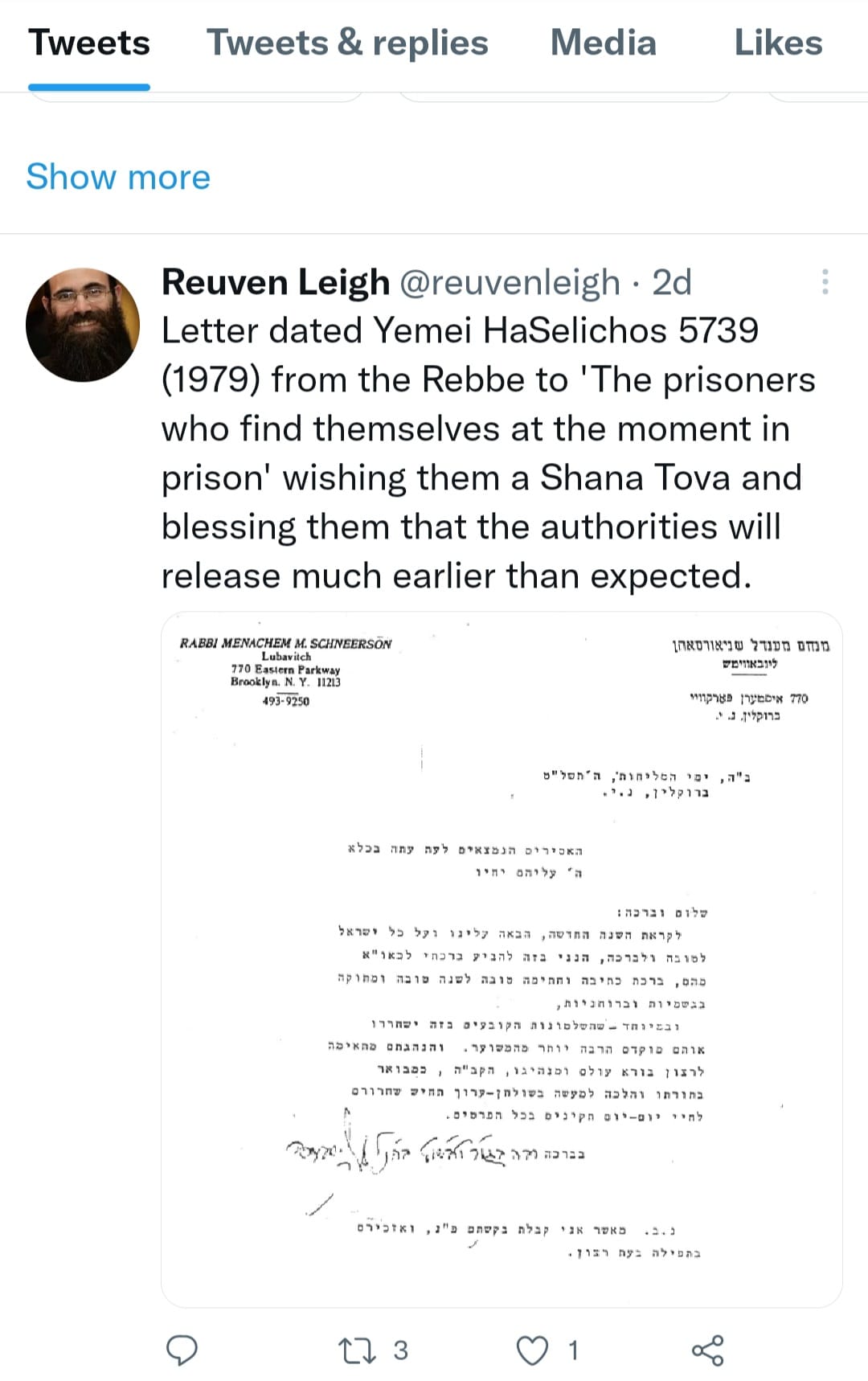First a little background: This week at Maimonides, I asked students in grades 4-8 the same few questions. One of them was: “If you had one (only one) Rosh Hashanah (Jewish New Years) card to mail out, whom would you send it to?” Remember, this isn’t an email blast or cut and paste text. It’s the good old-fashioned card type, put in an envelope and mailed through the post office. Who would you send yours to?
Most of the students at Maimonides (4th to 6th graders) answered that they would send it to their grandparents. True, grandparents would be very likely to appreciate a handwritten card. A few wrote they would send to friends, and a few said they would send it to seniors living alone or in a nursing home. Which is a thoughtful thought.
 And then after teaching, I went on my phone, and opened Twitter, where I saw this tweet from Rabbi Dr. Reuven Leigh, my Chabad on Campus colleague at Cambridge University in England. He shared a Hebrew letter from the Lubavitcher Rebbe, dated just before Rosh Hashanah of 1979, addressed to: “The prisoners who find themselves at the moment in prison” wishing them a Shana Tova and that the authorities release them much earlier than expected.
And then after teaching, I went on my phone, and opened Twitter, where I saw this tweet from Rabbi Dr. Reuven Leigh, my Chabad on Campus colleague at Cambridge University in England. He shared a Hebrew letter from the Lubavitcher Rebbe, dated just before Rosh Hashanah of 1979, addressed to: “The prisoners who find themselves at the moment in prison” wishing them a Shana Tova and that the authorities release them much earlier than expected.
Now, of course, it is not entirely the same thing as the exercise I did with my students. The Rebbe sent a great many Shana Tova letters, personal letters as well as pastoral/communal letters, and this letter seems to be a response to a letter these prisoners sent to the Rebbe. But it was quite striking to discuss these question with the kids, and then see this letter first thing.
(Before sharing this on Shabbat at Shabbos House with UAlbany students, we did the same exercise. It was quite interesting to hear what students shared. A few thought of sending it to a current students who is home this semester on medical leave, some to specific alumni who were active here in years past, a friend who helped them, a geographically distant relative, an aunt and uncle, and of course, the students many students also said they would send it to their grandparents).
After seeing this letter that my Cambridge colleague shared, I’d like to share a few takeaway messages:
1) Think of who would appreciate a letter, a call, or a thoughtful gesture. It doesn’t have to be grandparents. And not necessarily a card or letter. Even if your own circles of friends, there are those who are on the inside, always involved and included, and those more on the periphery, peers who can use a little more reach out and connection. Prisoners are people at the fringe of society, often forgotten and ignored by most people, this letter and wishes for them was most certainly uplifting and meaningful.
2) The form of address is quite wordy: “The prisoners who find themselves at this time in prison.” It’s a subtle reminder that while prison is their current circumstances (and even if it is so, sadly, for reason) it doesn’t have to be their identity. And the same is true of us. Perhaps, we’re not doing well in classes, and finding ourselves in a rut or bad groove. It doesn’t mean we should view ourselves as failures – even if it might be, at this moment, in a failing situation. Jewishly, too, we might be in circumstances or situations that are not conducive for Jewish growth, but we can see ourselves as different than our circumstances. This way we are not trapped by the situation but can find ways to rise above it. Even in prison!
3) The wish that “they be released much earlier than expected” blends hopeful optimism that’s also grounded in reality. Yes, the Rebbe also often uses words like immediately and without delay. But this wish – the way it is worded here – tells us that it may take time, it may not happen right away, but may it be much sooner than we expect. In our lives as well, we sometimes demand immediate results and overnight transformation. Look, it may take time, but the hope is that it work out sooner than expected.
4) The Rebbe’s condition for the “earlier release” is adherence to the laws of the Code of Jewish Law, so that it “actualize their freedom to daily life that is fixed/orderly/proper in all respects.” May we live our lives in accordance with Torah, so that our daily life be fixed (think all meanings of fixed: established, repaired, in good working order etc) in all respects.
